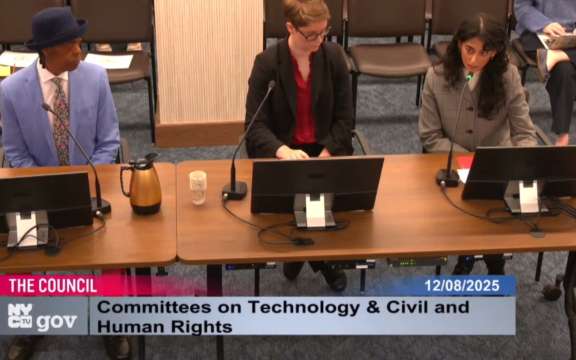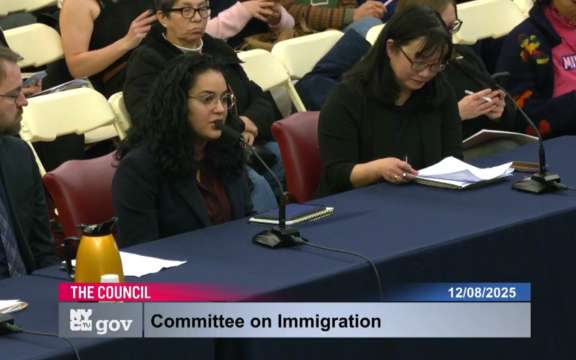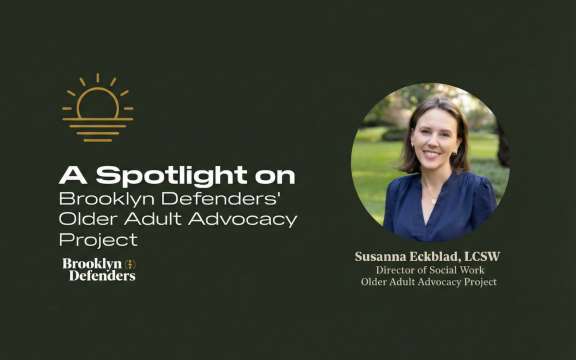BDS Testimony Before The New York State Assembly Committee on Codes and Committee on Correction Regarding Expansion of Youthful Offender Status
TESTIMONY OF:
Jacqueline Caruana – Senior Trial Attorney, Criminal Defense Practice
Presented before:
The New York State Assembly
Committee on Codes and Committee on Correction
Hearing on Sealing of Criminal Records
and Expansion of Youthful Offender Status
December 10, 2019
Introduction
My name is Jacqueline Caruana and I am a Senior Staff Attorney in the Criminal Defense Practice at Brooklyn Defender Services (BDS). BDS provides multi-disciplinary and client-centered criminal, family, and immigration defense, as well as civil legal services, social work support and advocacy, for over 30,000 clients in Brooklyn every year. I thank Chairpersons Joseph R. Lentol and David I. Weprin, as well as other members of the New York State Assembly Committees on Codes and Correction, for their leadership in criminal justice reform.
Brooklyn Defender Services’ has a specialized adolescent unit, called the Brooklyn Adolescent Representation Team, or BART. Our team represents over two thousand adolescents ages 13-21 annually. This includes adolescents detained at Crossroads and Horizons, ACS detention facilities in Brooklyn and the Bronx, as well as young people detained on Rikers Island.
Background
New York’s Youthful Offender (“YO”) law (Criminal Procedure Law § 720) provides the opportunity for any youth under the age of 19 to have a criminal conviction substituted with a non-criminal adjudication at sentencing. The YO law, which gives judges’ discretion to grant YO in more serious cases and is mandatory for first-time, low-level offenses, allows for reduced prison sentences and automatic sealing. 75 percent of 16- and 17-year-olds have their convictions converted to Youthful Offender adjudications.
These cases concern the most vulnerable young people in the adult system. Many of these YO findings prevent mandatory upstate prison time and have a significant impact on the number of young people in prison. The YO statute allows judges to use alternatives, including mental health and drug treatments, as well as proven youth-focused programs and the resources of the Department of Probation to help place young people on a better course. The fact that the record is immediately sealed improves the young person’s opportunities for employment, education and housing and provides critical protection from deportation. The existing statute does not allow judges to grant YO status to older adolescents ages 19-25 years old.
Modern neuroscience research indicates that a young person’s brain does not fully develop until their mid-twenties.[1] The Youthful Offender age limit should be expanded to protect young people ages 19-25 from many of the worst harms of criminalization while they age out of the impairment in judgment associated with their youth.
Expanding the existing Youthful Offender Status
Under the existing law, those under the age of 19 would be eligible to receive youthful offender status and have convictions sealed. However, for most offenses, the eligibility determination is a discretionary process determined by the judge. Therefore, Brooklyn Defender Services supports making YO eligibility for all D and E felonies, Acting in Concert Robbery in the Second Degree (P.L. 160.10 (1)), and felony drug offenses (Article 220 of the Penal Law) mandatory.
Other offenses, specifically A-I or class A-II felony defined in Articles 125, 130, 130, 485, or 490 of the criminal procedure law, or an armed felony offense or of rape in the first degree, criminal sexual act in the first degree, or aggravated sexual abuse should still be considered for YO eligibility on a discretionary basis. The current YO legislation requires the court to look for mitigation within the facts of the offense. However, this leaves judges without the ability to consider other pertinent factors such as the history and background of the young person, as well as prospects for rehabilitation. For this reason, BDS supports adding a list of additional factors so that the court can consider whether the interest of justice would be served by relieving the young person from the onus of a criminal record.
Lastly, a young person should not be barred from receiving Youthful Offender Status on a case, simply because they have “used” or received first offender status on a previous case. The last decade has given rise to a series of Supreme Court decisions that rely upon common sense, science, and social science to require that youth be considered differently than adults in both criminal procedure and sentencing matters. “There is evidence from brain science that the brain doesn’t completely mature until sometime during the early twenties”.[2] As we all know, teenagers often make more than one mistake before consequential thinking, part of their late adolescent development, really takes hold. Multiple opportunities for YO is of upmost importance in making sure those involved in the criminal justice system are not burdened with the lifelong repercussions of a criminal record and possible long jail sentences. Maturity in judgement can take time to develop, giving a young person Youthful Offender Status (along with supportive services) doesn’t mean that s/he has automatically outgrown and matured beyond the natural impulsivity and negative peer pressure that are the hallmarks of adolescence. As such, the court system must be flexible and designed to account for the fact that young people may make multiple mistakes and deserve to be treated as the adolescents they are.
Creating the Young Adult Offender Status
Many of our young clients are between the ages of 19 and 25. As mentioned, current neuroscience research proves that a young person’s brain does not fully develop until their mid-twenties. As a result, our clients that fall into this 19-25 age group are facing the severe collateral consequences of having a criminal record for the rest of their lives. Additionally, these young people are facing the same mandatory minimum sentencing provisions as adults charged with the same offenses. The protections afforded to those under the age of 19 should be appropriately extended, in some respects, to those aged 19-25.
However, simply changing the age of eligibility for Youthful Offender Status would have serious unintended consequences for young people who are non-citizens. Under the current laws, non-citizens that are afforded YO status are not subject to removability (inadmissibility or deportability) as a result of a YO case. That’s because the Board of Immigration Appeals has interpreted Article 720 of the New York Criminal Procedure Law, to correspond with a determination of Juvenile Delinquency under the Federal Juvenile Delinquency Act. [3] That correlation is crucial in protecting young non-citizens from the severe and permanent immigration consequences that would otherwise be invoked if they were prosecuted as adults; those consequences include mandatory detention in immigration custody, deportation, and eligibility for legal defenses to deportation. Any disturbance or expansion of the current Youthful Offender framework (as to age) increases the risk that it will be found not to correspond to the FJDA, and exempt youthful offenders from the immigration protections they currently retain.
Separate and apart from immigration consequences, we recognize that there are differences between the two age groups. As such, we acknowledge that the protections afforded to those receiving Young Adult Offender Status (YAO) as opposed to YO may be different, but we urge the legislature to keep these protections relatively the same.
Client Stories
Ms. W is 22 years old. She had never been arrested before this case. She is accused of committing a robbery in the second degree. The prosecution alleges that Ms. W took money from a man’s wallet, while her co-defendant was assaulting the man. Ms. W’s co-defendant has a criminal record. Ms. W has not been accused of assaulting anyone, only her co-defendant is accused of causing physical injury to someone. At the time of her arrest Ms. W was trying to get her GED. After she was arrested, she completed the GED program and obtained a job working for a store at JFK airport. But when her employer found out that she had this criminal case pending they fired her, despite her lawyer’s attempt to explain to her employer that she did not have a criminal record, but instead a pending case. Ms. W has also been seeing a counselor and has been approved to participate in the Women’s Prison Association Program, which is an ATI (alternative to incarceration) program. Despite all of this, the prosecution is currently offering Ms. W a plea offer of 3 ½ years in prison. In addition to a prison sentence, she would have a felony conviction on her record for the rest of her life. If the legislature were to pass legislation authorizing the creation of a Young Adult Offender Status, Ms. W’s lawyer could ask the judge to consider sentencing Ms. W to a non-prison sentence and YAO, which would seal her record. Without YAO, Ms. W must rely on the discretion of the prosecution and obtain their consent for a plea offer. It is very unlikely that even if Ms. W was to receive a non-prison plea offer from the prosecution that she would avoid having a criminal record for the rest of her life.
Ms. P is 22 years old. She does not have a criminal record. She is accused of committing an Assault 2, because she is alleged to have assaulted a man with a stick. Ms. P has a 3-year-old son and at the time she was arrested she was working as a home health aide. She has since lost that job. She has been making court appearances since March of 2019 but was having difficulty managing child care during the pendency of her case. She lives with her mother and son in public housing. Similar to Ms. W, without a plea offer from the prosecution that would result in non-jail and a non-criminal conviction, Ms. P is facing serious collateral and enduring consequences. She stands to lose her housing, her ability at obtaining gainful employment, and custody of her child if she were to go to jail or prison. If the legislature were to pass legislation authorizing the creation of a Young Adult Offender Status, Ms. P’s lawyer could ask the judge to consider sentencing Ms. P to a non-prison sentence and YAO, which would seal her record.
Mr. B was 21 at the time he was arrested. Because of his age he was not eligible for Youthful Offender treatment and he ended up taking a plea to a single count of unlawful imprisonment in the first degree with a prison sentence of 1-3 years. While he was incarcerated, he completed multiple college courses, graduating at the top of his class. He also completed his OSHA certification. Since he was released from prison, he has continued to further his education but has sincerely struggled in finding employment because of his criminal record. He has applied to several jobs, including a job with Amazon, where he was specifically denied because of his criminal record. He has also to had to move out of his mother’s apartment because she lives in public housing and she was told that if he continued to live with her she would be evicted because of his felony record. Mr. B is a prime example of a young person who made a mistake at an age when he was especially vulnerable and impressionable. He is doing everything he can to make a future for himself, despite having served time in prison, yet his criminal record will forever hold him back. If the legislature were to pass legislation authorizing the creation of a Young Adult Offender Status, young people like Mr. B would be able to move forward with their lives making it more likely they could achieve their dreams such as Mr. B’s goal to start his own business.
Conclusion
Expanding eligibility for Youthful Offender Status and creating a Young Adult Offender Status are critical reforms that will give judges discretion to limit the lifelong harms of criminal records and the trauma that incarceration causes on young people. We strongly urge the legislature to pass and the Governor to sign such legislation into law this session.
If you have any questions, please feel free to reach out to Jacqueline Caruana, Senior Attorney, Criminal Defense Practice, 718-254-0700 ext. 388 or jcaruana@bds.org.
[1] 2 See, e.g., Lucy Wallis, Is 25 the new cut-off point for adulthood?, BBC NEWS, Sept. 23, 2013, available at http://www.bbc.com/news/magazi...;
[2] The Age of Opportunity, Lawrence Steinberg, p. 6
[3] See Matter of Devison Charles, 22 I&N Dec. 1362 (BIA 2000).



